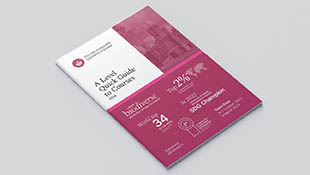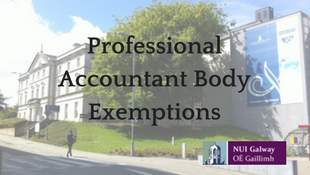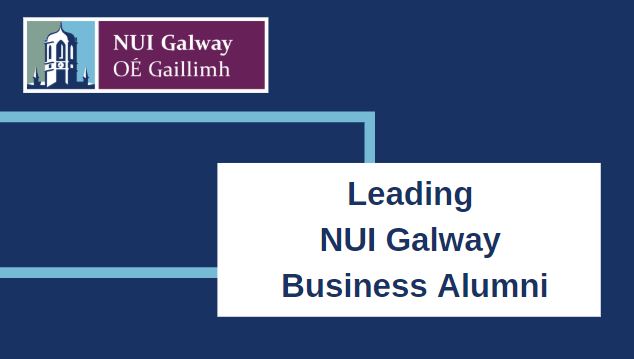-
Courses

Courses
Choosing a course is one of the most important decisions you'll ever make! View our courses and see what our students and lecturers have to say about the courses you are interested in at the links below.
-
University Life

University Life
Each year more than 4,000 choose University of Galway as their University of choice. Find out what life at University of Galway is all about here.
-
About University of Galway

About University of Galway
Since 1845, University of Galway has been sharing the highest quality teaching and research with Ireland and the world. Find out what makes our University so special – from our distinguished history to the latest news and campus developments.
-
Colleges & Schools

Colleges & Schools
University of Galway has earned international recognition as a research-led university with a commitment to top quality teaching across a range of key areas of expertise.
-
Research & Innovation

Research & Innovation
University of Galway’s vibrant research community take on some of the most pressing challenges of our times.
-
Business & Industry

Guiding Breakthrough Research at University of Galway
We explore and facilitate commercial opportunities for the research community at University of Galway, as well as facilitating industry partnership.
-
Alumni & Friends

Alumni & Friends
There are 128,000 University of Galway alumni worldwide. Stay connected to your alumni community! Join our social networks and update your details online.
-
Community Engagement

Community Engagement
At University of Galway, we believe that the best learning takes place when you apply what you learn in a real world context. That's why many of our courses include work placements or community projects.
Business Information Systems (H Dip)
Course Overview
The worlds of business and digital technology have become inseparable. Almost all organisations now depend upon business information systems (BIS) to control and manage their data, which means that the demand for graduates with technological proficiency and business know-how is at an all-time high. Studying BIS involves, among other things, learning how to design and build ICT systems, as well as understanding how to exploit the business opportunities provided by the ever increasing digitisation of society. To do this, we must develop an intricate understanding of how organisations work, the business processes that generate and consume information, the roles of people and working groups in these processes, and the efficiency of these processes.
The main goal of Higher Diploma in BIS is to prepare graduates for employment in an ICT-related business context. This course will introduce students to the principles, methods, tools and architectures used in the development and management of ICT. Upon graduating, course participants will be equipped to manage digital technology across all industry sectors and in a range of business functions.
The employment prospects for graduates of this course are extremely good. Graduates may take up positions as systems or business analysts, technology consultants, computer programmers, network administrators, in a range of business functions, including marketing, logistics, production, finance and general business administration.
Graduates of this course will be able to:
- Use a range of ICT skills and display mature literacy and comprehension of business, technology, and technology management subject matter that compares favourably with national and international peers.
- Identify, analyse and solve business, technology, and technology management problems in applied and other settings.
- Effectively manage the ICT resource in international contexts, and therefore demonstrate an understanding of the roles and management of ICT in organisations.
Applications and Selections
Application via Springboard Courses website.
Who Teaches this Course
Lecturers on this programme (to be confirmed):
Requirements and Assessment
Semester One exams: December.
Semester Two exams: April/May.
A range of assessment methods are applied throughout the programme. These include essays, projects, reports, presentations and case studies.
Key Facts
Entry Requirements
The programme is open to degree holders from a university or other recognised degree-awarding body. Applicants should hold an NQAI Level 8 qualification or equivalent; IELTS score of 6.5 or equivalent, if applicable.
Additional Requirements
Recognition of Prior Learning (RPL)
Duration
1 year, full-time
Next start date
September 2023
A Level Grades ()
Average intake
30
QQI/FET FETAC Entry Routes
NFQ level
Mode of study
Blended Learning
ECTS weighting
60
Award
CAO
Course code
Course Outline
Modules for Higher Diploma in Business Information Systems
Semester 1
MS873: Management Information Systems I—5 credits [core]
AY5123: Accounting and Financial Analysis—5 credits [optional]
MG524: Management—5 credits [optional]
MK204: Marketing Principles—5 credits [optional]
AY872: Financial Management I—5 credits [optional]
EC5113: Principles of Economics for Business — 5 credits [optional]
MS111: Business Application Development [optional]
MS222: Decision Modelling and Analytics - 5 credits [optional]
Semester 2
MG3109: Innovation: Creativity and Enterprise—5 credits [core]
MS2100: Cybersecurity—5 credits [optional]
MS4101: Implementing Digital Innovation—5 credits [optional]
MS319: Enterprise Systems—5 credits [optional]
MS112: Business Application Development 2—5 credits [optional]
MS412: Information Systems Innovation—5 credits [optional]
MS119: Business Data Communications—5 credits [optional]
MS2101: Managing Digital Transformations—5 credits [optional]
MS4100: Advanced Research Topics in Information systems 5 credits [optional]
MS4101: Implementing Digital Innovation - 5 credits [optional]
Semester 1 & 2
MS5116 Major Project (Digital Transformation Company Project) —10 credits [core]
Download Module Descriptions Document here.
Curriculum Information
Curriculum information relates to the current academic year (in most cases).Course and module offerings and details may be subject to change.
Glossary of Terms
- Credits
- You must earn a defined number of credits (aka ECTS) to complete each year of your course. You do this by taking all of its required modules as well as the correct number of optional modules to obtain that year's total number of credits.
- Module
- An examinable portion of a subject or course, for which you attend lectures and/or tutorials and carry out assignments. E.g. Algebra and Calculus could be modules within the subject Mathematics. Each module has a unique module code eg. MA140.
- Optional
- A module you may choose to study.
- Required
- A module that you must study if you choose this course (or subject).
- Semester
- Most courses have 2 semesters (aka terms) per year.
Year 1 (60 Credits)
Why Choose This Course?
Career Opportunities
Graduates get jobs in a diverse range of industries, such as marketing, financial services, information systems and human resources. Graduates have been employed by Allied Irish Bank, Bank of Ireland, Central Bank of Ireland, AVIVA and Jameson. Every year a number of graduates pursue further postgraduate study at master’s level, such as the MSc Marketing Practice, MSc Information Systems Management, MSc International Management and MSc Human Resources Management.
Who’s Suited to This Course
Learning Outcomes
Transferable Skills Employers Value
Work Placement
Study Abroad
Related Student Organisations
Course Fees
Fees: EU
Fees: Tuition
Fees: Student levy
Fees: Non EU
*A 10% course fee contribution (€600) for graduate conversion courses is applicable for employed participants and recent graduates.
The formerly self-employed not in receipt of a DEASP payment must also pay 10%. This is payable directly to the provider.
There are no tuition fees for DEASP customers or Returners but any subsequent costs such as travel, and course materials must be borne by the participant
For further details see https://springboardcourses.ie/faq
Find out More
Further information on how to apply here
Contact us:
E: HCIBusiness@universityofgalway.ie
Downloads
-

Business Postgraduate Programmes 2024 PDF (4.7 MB)
-

Postgraduate Prospectus 2024 PDF (3.3MB)
-
.png)
Business Undergraduate Prospectus 2024 PDF (1.57MB)
-

Undergraduate Prospectus 2024 PDF (14.6MB)
-

A Level Quick Guide 2024 PDF (337 KB)
-

Professional Accounting Body Exemptions PDF (8 KB)
-
Leading Business Alumni Book PDF (1.57)
-

Quick Guide to Courses 2024 PDF (362 KB)
















